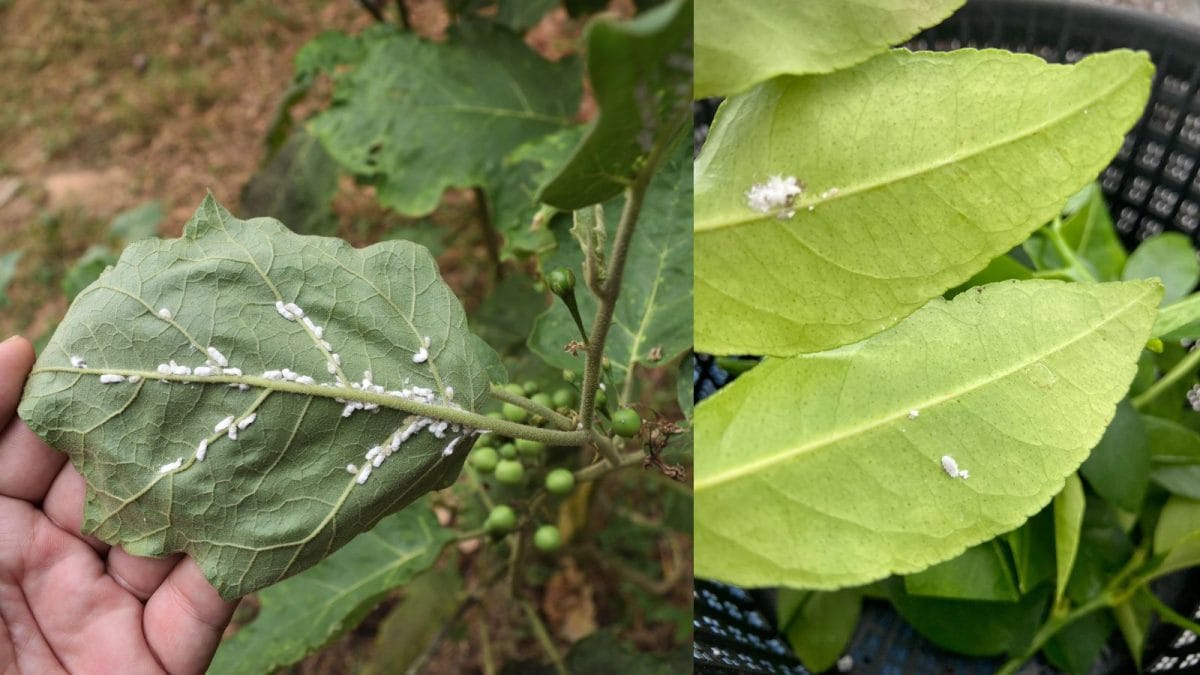Last Updated:
While many rush to buy expensive pesticides, agricultural scientists say the solution could be hiding in your bathroom cabinet — a one-rupee shampoo sachet.

This method is not just cheap but also safer for plants and the environment compared to synthetic pesticides (Image: Canva)
For most gardeners, the sight of white, cottony clumps on plant stems or leaves is a nightmare. These are mealybugs — tiny, soft-bodied pests that look harmless but can quietly destroy an entire garden.
While many rush to buy expensive pesticides, agricultural scientists say the solution could be hiding in your bathroom cabinet — a one-rupee shampoo sachet.
According to agricultural scientist Dr Arvind Kumar from ISECT University, Hazaribagh, mealybugs multiply at lightning speed and can devastate crops if not controlled early.
His advice is simple: regular monitoring and an immediate response using low-cost methods can save both your garden and your wallet.
How Mealybugs Destroy Plants
Mealybugs are small, oval-shaped insects that feed by sucking sap from soft plant parts like leaves, stems, and fruits. “They drain the nutrients, causing the plants to weaken, turn yellow, and eventually dry up,” explains Dr Kumar. “In severe cases, the entire plant can die.”
Apart from the damage they cause directly, mealybugs leave behind a sticky substance called honeydew. This sticky residue attracts sooty mold — a black or white fungus that coats the leaves and prevents them from photosynthesizing properly. The result is slow plant growth, poor flowering, and reduced yield in fruiting plants.
If unchecked, these pests spread rapidly from one plant to another. This is why agricultural experts urge early detection and immediate treatment.
The One-Rupee Shampoo Trick
Here’s where the surprising home remedy comes in. Dr Kumar notes that a shampoo solution can effectively destroy mealybugs because of its chemical structure.
“Mix a one-rupee packet of shampoo in about one litre of water and spray it directly on the affected areas,” he says. “The surfactants in the shampoo break down the waxy, protective coating on the mealybug’s body. Once that outer layer is dissolved, the pest dries up and dies within hours.”
This method is not just cheap but also safer for plants and the environment compared to synthetic pesticides. However, experts recommend testing it first on a small portion of the plant to ensure there’s no sensitivity, especially for delicate flowering species.
Natural Remedies That Work
Dr Kumar also points out that mealybugs can be controlled through biological methods that don’t require chemicals at all. Neem oil spray and garlic-ginger extracts are two popular natural repellents that help reduce pest activity.
To make a simple neem solution:
- Mix 30 ml of neem oil with a few drops of liquid soap in one litre of water.
- Shake well and spray on affected plants every few days.
For a garlic-ginger mix:
- Blend equal parts garlic and ginger with water, strain, and spray the solution on leaves.Both these natural options work best when pest infestations are still small.
If the mealybugs have already spread to several plants, experts recommend removing the worst-affected plants to prevent the infestation from spreading further.
When to Use Pesticides
While natural or low-cost solutions are often effective, severe infestations sometimes demand stronger action. In such cases, Dr Kumar advises farmers and gardeners to use insecticides like Imidacloprid, Thiamethoxam, or Chlorpyrifos, following dosage and safety instructions carefully.
However, he cautions against excessive pesticide use, noting that it can harm beneficial insects and pollinators. “Chemical pesticides should always be the last resort,” he adds. “A combination of vigilance, early action, and biological control usually keeps mealybugs under check.”
A Sustainable Solution for All
What makes the shampoo trick particularly interesting is its accessibility. Whether you’re a home gardener with a few balcony plants or a farmer managing acres of crops, this inexpensive method offers a practical, eco-friendly way to manage pest problems.
This approach also aligns with the larger movement toward sustainable agriculture — using every day, biodegradable materials instead of harsh chemicals to protect crops and reduce soil and water pollution.
As Dr Kumar sums up, “We’ve been conditioned to believe only pesticides can kill pests. But sometimes, the simplest household product — even a one-rupee shampoo packet — can do the job just as effectively.”
So, the next time you spot those white cottony insects lurking on your hibiscus or chili plants, skip the expensive sprays. Reach for that shampoo sachet instead. It might just be the most cost-effective plant rescue mission you’ll ever try.
Our life needs a bit of style to get the perfect zing in the daily routine. News18 Lifestyle is one-stop destination for everything you need to know about the world of fashion, food, health, travel, relationshi…Read More
Our life needs a bit of style to get the perfect zing in the daily routine. News18 Lifestyle is one-stop destination for everything you need to know about the world of fashion, food, health, travel, relationshi… Read More
West Bengal, India, India
October 31, 2025, 11:37 IST
Stay Ahead, Read Faster
Scan the QR code to download the News18 app and enjoy a seamless news experience anytime, anywhere.







